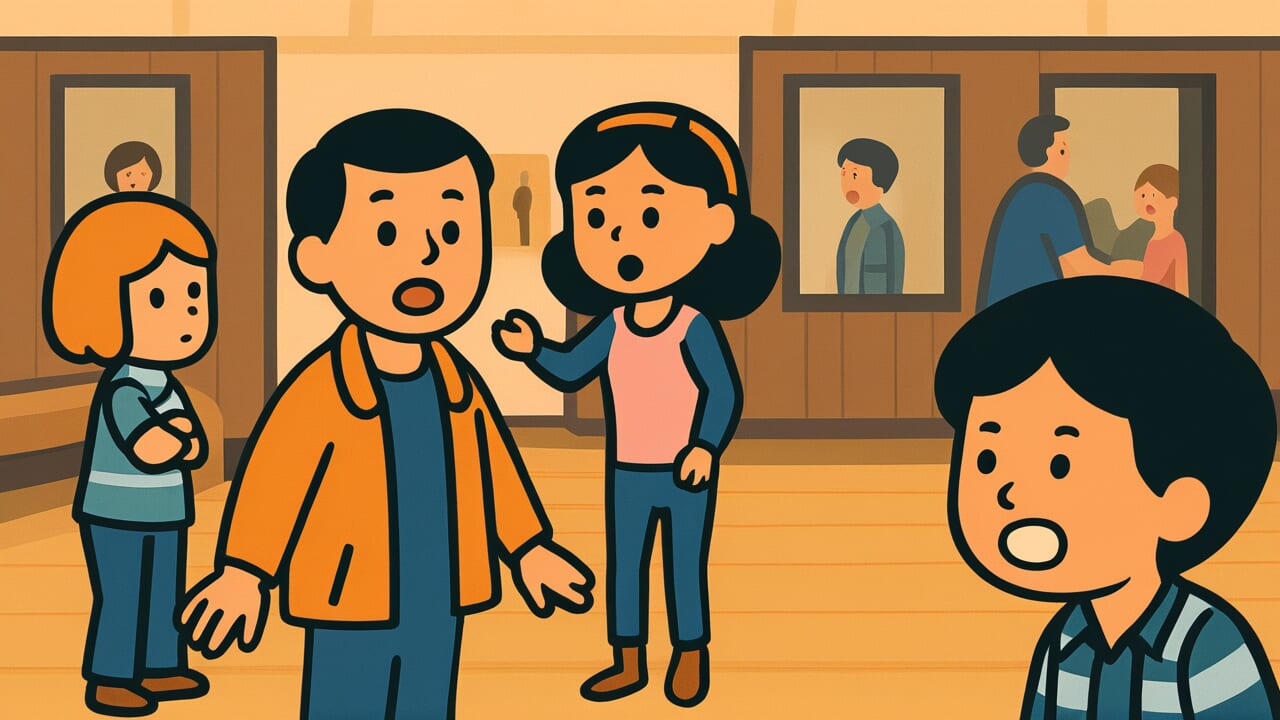How to Read “Don’t interfere in children’s quarrels”
Kodomo no kenka oya kamawazu
Meaning of “Don’t interfere in children’s quarrels”
This proverb teaches that parents should not get involved in minor disputes between children.
When children argue over toys or have small disagreements during play, this is a natural part of growing up.
If parents rush in to mediate or complain to other parents, the problem often becomes bigger than it needs to be.
Children can make up quickly on their own. But when parents interfere, emotional resentment can linger.
This proverb is used when parents are about to overreact to a small fight between kids.
Saying “Don’t interfere in children’s quarrels” reminds adults to stay calm. It encourages them to let children solve problems on their own.
Even today, this wisdom teaches that stepping back helps children develop social skills.
Origin and Etymology
The exact origin of this proverb is unclear. However, it was likely already in use among common people during the Edo period.
The phrase combines two elements: “children’s quarrels” and “parents don’t interfere.”
The word “kamawazu” means “don’t get involved” or “don’t interfere.”
Traditional Japanese parenting valued children’s independence. In samurai society especially, small conflicts between children were seen as learning opportunities.
Through these quarrels, children learned to solve problems themselves and understand proper social distance.
Parents believed that too much interference would rob children of chances to grow.
In Edo-period neighborhoods, children played together in alleys and streets. They had small fights while learning social skills.
Parents had an unspoken agreement not to make a fuss over these quarrels. They left things to the children.
This practical wisdom from daily life gradually became a proverb.
Usage Examples
- Children at the park started arguing, but following “Don’t interfere in children’s quarrels,” I just watched. Soon they were playing together with smiles.
- I heard my son had a conflict with his friend and felt worried. But “Don’t interfere in children’s quarrels,” so I’ll let them handle it first.
Universal Wisdom
“Don’t interfere in children’s quarrels” contains deep insights about distance and trust in human relationships.
We humans naturally want to help when someone is struggling. When our children or loved ones face conflict, we want to jump in and protect them.
This comes from love and is not a bad thing. But our ancestors understood a paradox.
Sometimes this protective instinct actually prevents people from growing.
Through quarrels, children learn to understand others’ feelings. They learn to control their own emotions and repair relationships.
When parents interfere, these valuable learning opportunities disappear.
What’s fascinating is that children make up surprisingly quickly. But when adults get involved, problems become complicated and drag on.
This proverb has survived because humans face a difficult challenge: maintaining appropriate distance.
We become overprotective because we love. We stop trusting others’ abilities because we want to protect them.
This human tendency doesn’t change with time. True love sometimes means having the courage to watch without helping.
This profound insight is packed into these few words.
When AI Hears This
A quarrel between children starts from a small conflict of interest, like “you took my toy.”
At this stage, the loss to both sides is extremely small. Even if they cry or get angry, they often forget and play together minutes later.
In game theory terms, this is a “cooperative game” where both parties gain if they compromise.
But when parents interfere, the game structure completely changes.
Parents instinctively protect their child by sending a signal to the other parent: “Your child is wrong.”
The other parent becomes defensive and responds the same way. This creates an escalation-commitment problem.
Once you take a position, backing down means “losing.” So you keep investing more and more.
What’s interesting is the size of the cost parents invest.
If the “damage” from the children’s quarrel is 100, the conflict between parents easily exceeds 1000.
This includes emotional exhaustion, neighborhood reputation damage, and destroyed long-term relationships.
And often the children have already made up, while only the parents continue fighting.
This same structure appears in corporate price wars and international conflicts.
Problems that could be solved cheaply in early stages turn into wars of attrition where nobody wins. This happens when pride and organizational logic get involved.
Lessons for Today
This proverb teaches modern people the importance of “the courage to trust and let go.”
In modern society, overprotection and interference are problems everywhere.
At work, bosses micromanage their employees. At school, parents immediately intervene in their children’s troubles.
In relationships, we try to solve other people’s problems for them.
We act with good intentions, but we might be stealing growth opportunities from others.
What matters is trusting and watching over people. Of course, you should intervene in truly dangerous or serious situations.
But in most cases, people have the power to solve problems themselves.
When you step back and wait, they can stand up on their own and become stronger.
This wisdom applies to all relationships, not just parenting.
A boss who watches an employee’s mistakes, a friend who doesn’t force answers on someone’s worries, a partner who respects the other’s choices.
Trusting and letting go is the highest form of respect. It’s the deepest expression of love.



Comments